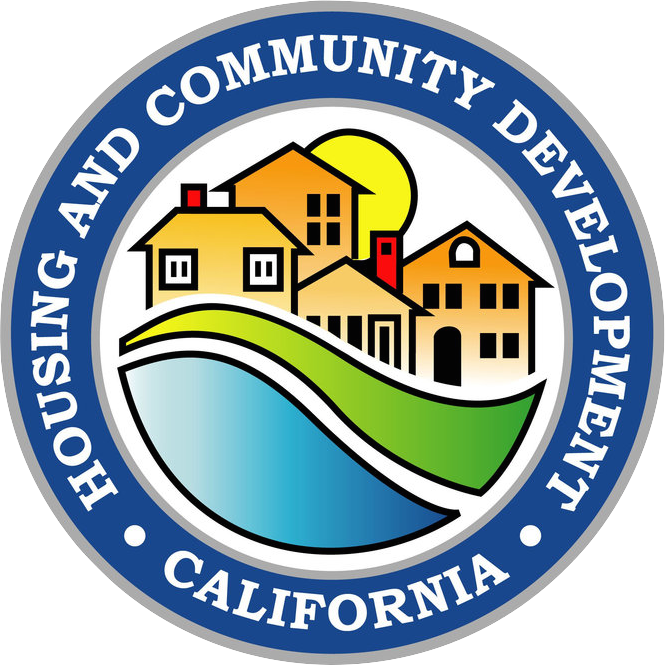Regional Early Action Planning (REAP) Grants of 2021
The Regional Early Action Planning Grants of 2021 (REAP 2.0) are a key part of the state’s strategic investments toward a more sustainable, resilient, and inclusive future.
REAP 2.0 builds on the success of REAP 2019, but expands the program focus by integrating housing and climate goals, and allowing for broader planning and implementation investments (including infrastructural investments that support infill development which facilitates housing supply, choice, and affordability).
Contact Us
Can't find what you're looking for? Email us!
Higher Impact Transformative
REAP 2.0 HIT NOFA Guidelines Webinar November 18, 2022
Tribal Entities
REAP 2.0 Tribal NOFA Guidelines Webinar July 28, 2022
Tribal Entities Presentation Slides (PDF)
Metropolitan Planning Organizations (MPOs)
REAP 2.0 MPO NOFA Guidelines Webinar August 9, 2022
Rural County Eligible Entities
REAP 2.0 Rural Counties & Eligible Entities NOFA Webinar August 11, 2022
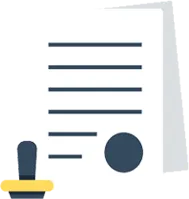
Apply Now

Apply Now
Higher Impact Transformative
REAP 2.0 HIT NOFA Guidelines Webinar November 18, 2022
Tribal Entities
REAP 2.0 Tribal NOFA Guidelines Webinar July 28, 2022
Tribal Entities Presentation Slides (PDF)
Metropolitan Planning Organizations (MPOs)
REAP 2.0 MPO NOFA Guidelines Webinar August 9, 2022
Rural County Eligible Entities
REAP 2.0 Rural Counties & Eligible Entities NOFA Webinar August 11, 2022
REAP 2.0 is a flexible program that will accelerate progress towards our state housing goals and climate commitments through a strengthened partnership between the state, its regions, and local entities. REAP 2.0 funds will accelerate infill housing development, reduce Vehicle Miles Traveled (VMT), increase housing supply at all affordability levels, affirmatively further fair housing (AFFH), and facilitate the implementation of adopted regional and local plans to achieve these goals.
REAP 2.0 is administered by the California Department of Housing and Community Development (HCD) in collaboration with the Governor’s Office of Planning and Research (OPR), the Strategic Growth Council (SGC), and the California Air Resources Board (CARB).
REAP 2.0 provides an investment to advance implementation of adopted regional plans by funding planning and development activities that accelerate infill housing and reductions in per capita VMT.
Eligible Applicants
REAP 2.0 Funding Allocations and Eligible Applicants:
- MPO Allocations (480 million)
- Rural & Tribal (30 million)
- Higher Impact Transformative (30 million)
- Government Administration (20 million)
Most of the program’s funding ($480 million) will flow directly to the state’s 18 Metropolitan Planning Organizations (MPOs), and the MPOs may suballocate a portion of the funds to eligible entities (cities, counties, transit/transportation agencies) in their metropolitan region. The remaining funds are split into a set aside for Tribal entities and for eligible entities in smaller counties in non-MPO regions ($30 million), as well as for a Higher Impact Transformative set aside for all eligible entities ($30 million).
Eligible Activities
This is a flexible program. Funds can be utilized for planning efforts, or for implementing existing plans, as they relate to housing and infrastructure to support new housing.
All REAP 2.0 applications must satisfy both housing and VMT reduction goals while emphasizing the nexus between housing and climate change in ways that advance equity and improve underlying social and health vulnerabilities that may have contributed to more severe public health outcomes of the pandemic.
- Statute does specify the following broad categories of eligible uses, though the program does allow some flexibility, and proposed uses must demonstrate a nexus to all program objectives:
- Accelerating infill housing development
- Realizing multimodal communities
- Shifting travel behavior by reducing driving
- Increasing transit ridership
- See REAP 2.0 Final Guidelines for more information.
Accelerate Infill
Housing
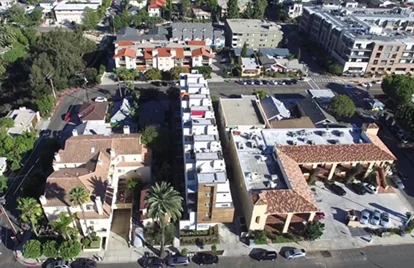
Affirmatively Further
Fair Housing
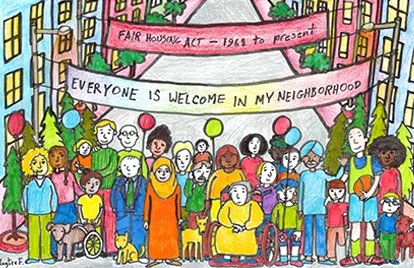
Reduce Vehicle Miles
Traveled (VMT)
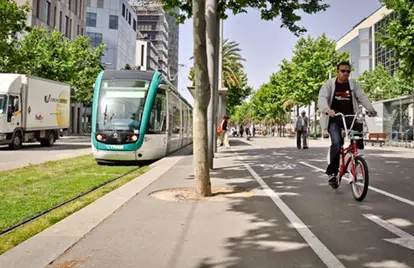
The application period closed on December 31, 2022. Application materials can be found in the “Archive” tab.
| Activity | Description | Timing |
|---|---|---|
| Collaboration Design and Kick Off | Convening of state agency collaborative, early discussion of program parameters and staffing. | Summer 2021 |
| Framework Paper | Initial concepts and survey for broad stakeholder input. | November 2021 |
| Advance Application Available (“Formula Allocations for MPOs and COGs”) | Up to 10% of program funds can be requested by eligible entities under the “Formula Allocations for MPOs and COGs”. | January 2022 |
| Technical Assistance, Marketing, Direct Assistance to Applicants | State will conduct a variety of outreach events including statewide webinar, regional events, and will provide direct assistance and consultations to eligible entities. | December 2021 - June 2024 |
| MPO and Rural and Tribal Final NOFA and Guidelines Launch | Announcing funding availability and program requirements for MPOs, Rural and Tribal applicants. | Summer 2022 |
| Final Application Launch | Opening of the application period with program guidelines. | Summer 2022 |
| Higher Impact Transformative Allocation NOFA and Guidelines Launch | Open of competitive Higher Impact Transformative Allocation application period with program guidelines. | Fall 2022 |
| Application Period for all Allocations | Summer 2022 - December 31, 2022 | |
| Deadline to submit Executed Resolution | Deadline to submit executed authorizing resolution. | February 15, 2023 |
| Higher Impact Transformative (HIT) Allocation: Legally Binding Agreement Deadline | Extended deadline to submit a legally binding agreement for the HIT allocation. | March 31, 2023 |
| Award Decisions | Award announcements for all three funding allocations. | Summer 2023 |
| Encumbrance Deadline | All funds must be encumbered. | September 2024 |
| Annual Reports | Recipients submit and post annual reports and state posts annual report and other applicant information | April - June of every year* |
| Expenditure and Close-out Report | All funds must be expended at this time with close-out reports completed. | June 30, 2026 |
| * Recipients shall submit a report by April 1 of the year following the receipt of those funds, and annually thereafter until those funds are expended. In turn, the state will post annual reports with supplemental information. | ||
REAP 2.0 Metropolitan Planning Organization (MPO) Awards:
$480,000,000 in non-competitive funding is available to the state’s Metropolitan Planning Organizations (MPOs) for planning and implementation activities that support REAP 2.0’s goals and objectives.
MPO Awards:
- Association of Monterey Bay Area Governments (AMBAG): $9.5 million to establish a competitive grant suballocation to local jurisdictions, a non-competitive RHNA-based local suballocation, SCS implementation, and local TA.
- Butte County Association of Governments (BCAG): $2.77 million to construct pedestrian and bicycle improvements in the City of Biggs; facilitate complete street improvements in a low-income area of the City of Chico; construct pedestrian and bicycle infrastructure along the Highway 99 corridor in the City of Gridley; facilitate active transportation connections between important activity centers and destinations in the downtown area of the City of Oroville; establish a Sewer Service Overlay Zone along main commercial arterials in the Town of Paradise; and fund predevelopment work for affordable multifamily housing in the Town of Magalia.
- Fresno Council of Governments (FCOG): $12.8 million to suballocate to local jurisdictions to fund projects that accelerate infill housing development, affirmatively further fair housing, and reduce VMT
- Kern Council of Governments (Kern COG): $11.9 million to fund two affordable housing developments (for low-income residents and seniors); alley improvements to facilitate the construction of accessory dwelling units (ADUs); fee offsets; an electric vehicle (EV) carport; and provide technical assistance (TA) for the City of Arvin.
- Kings County Association of Governments (KCAG): $1.9 million to suballocate to local agencies that will carry out projects related to REAP 2.0 program goals and objectives.
- Madera County Transportation Commission (MCTC): $2 million to fund transformative projects that will support disadvantaged communities, regional connectivity, and infill affordable housing along multimodal corridors.
- Merced County Association of Governments (MCAG): $3.6 million to suballocate through two programs – one non-competitive RHNA-based suballocation for local jurisdictions to utilize for eligible planning activities and one competitive suballocation to be used for transformative capital improvement projects.
- Metropolitan Transportation Commission (MTC): $96.7 million to fund Plan Bay Area Housing Preservation and Priority Sites Pilot; regional transit fare coordination and integration; and community based transportation and budgeting.
- Sacramento Area Council of Governments (SACOG): $31.7 million to fund the Green Means Go program, which will award one-time funding through planning and capital infrastructure investments for non-transportation projects in locally adopted Green Zones (priority growth areas) that improve housing affordability.
- San Diego Association of Governments (SANDAG): $40.5 million to fund affordable housing development, to establish an affordable housing trust fund, and three separate suballocation programs: one to local jurisdictions for planning and capital investment; one to transportation agencies for studies and predevelopment work to create mobility hubs; and one to tribal entities for predevelopment plans, studies, and outreach materials for housing proposals.
- San Joaquin Council of Governments (SJCOG): $9.9 million to fund several projects, including the Regional Supportive Infrastructure & Clean Mobility Initiatives; the Regional Housing Acceleration Fund Set Aside; Formula Funded Local Programs and Projects; and Program Administration and regional initiatives.
- Santa Barbara County Association of Governments (SBCAG): $5.4 million to suballocate to the following projects: infrastructure improvements in the downtown area of the City Santa Maria; a permit-ready ADU program in the City of Lompoc; construction of a prototypical single-family home utilizing 3D printing construction technology; County-wide active transportation dashboard; connective, multipurpose path in the City of Goleta; pilot housing project in the City of Santa Barbara converting vacant and underutilized city-owned property to affordable housing; 100% affordable housing project in the Town of New Cuyama.
- San Luis Obispo Council of Governments (SLOCOG): $3.3 million for the Community Betterment Grant Program that will provide streetscape and infrastructure improvements in the City of Grover Beach, including sidewalks, bike lanes, medians, and other place-based investments along West Grand Avenue; and the City of San Luis Obispo's main active transportation network including bike lanes, ADA upgrades, and traffic calming.
- Shasta Regional Transportation Agency (SRTA): $2.1 million to develop two infill sites for housing affordable to low- and moderate-income households and to make infrastructure improvements to provide greater connectivity and more transportation options in Downtown Shasta Lake.
- Southern California Association of Governments (SCAG): $231.5 million for several programs including: Programs to Accelerate Transformative Housing (PATH), Transportation Partnership Program (TPP), Subregional Partnership Program 2.0, Sustainable Communities Program for civic engagement, equity, and environmental justice, and a Big Data Platform.
- Stanislaus Council of Governments (StanCOG): $7 million to suballocate to development that fulfills the regional housing needs allocation (RHNA). Funds will also be used for Community Enhancement Zone Plans (focuses on middle housing and transportation solutions in developed areas); a VMT mitigation bank; SCS implementation (bike/pedestrian projects, Modesto bus rapid transit, vanpool program expansion); and program administration.
- Tahoe Regional Planning Agency (TRPA): $568,596 to update density, height, and coverage regulations to facilitate multifamily development and accessory dwelling units, increasing housing supply, choice, and affordability in the region.
- Tulare County Association of Governments (TCAG): $6 million to fund four projects that implement part of the first phase of the Cross Valley Corridor Plan which is the foundation of the recently adopted Regional Transportation Plan and Sustainable Communities Strategy. These include a neighborhood village supportive housing in Goshen; a new multi-modal transit center in Farmersville; a transit pass voucher program; and a high-density, affordable housing project for seniors in Visalia.
REAP 2.0 Higher Impact Transformative (HIT) Awards:
$30,000,000 in competitive funding was awarded to communities for place-based planning and implementation activities that support REAP 2.0’s goals and objectives. This allocation prioritized projects that will have a high impact in disadvantaged and historically underserved communities.
HIT Awards:
- City of Oakland: $10 million for Transit Oriented Development around the Mandela BART station, including funding predevelopment activities, infrastructure, and a universal basic mobility program.
- City of Rancho Cordova: $4 million for non-transportation infrastructure investments for Transit Oriented Development around the Mather Mills Light Rail Station.
- Tahoe Regional Planning Agency (TRPA): $2.41 million to Update TRPA growth management, environmental clearance, and Transfer of Development rights programs to incorporate equity, address climate change concerns, and facilitate infill development.
- San Diego Association of Governments (SANDAG): $10 million for infrastructure investments, capital improvements, and establishing a Community Land Trust (CLT) along the Trolley Blue Line.
- Bay Area Rapid Transit (BART): $3.58 million to establish a revolving loan fund to fund predevelopment activities for affordable housing development on BART-owned land.
REAP 2.0 Tribal and Rural Allocation Awards:
$30,000,000 in competitive funding was awarded to Tribal entities and rural communities for place-based planning and implementation activities that support REAP 2.0’s goals and objectives. This allocation will fund transformative planning activities and implementation projects on Tribal lands and in rural counties not represented by an MPO.
Tribal and Rural Awards:
- Big Valley Band of Pomo Indians: $5 million to undertake a rancheria-wide master planning process, develop infill housing, and make utility and infrastructure improvements, including wayfinding, a pedestrian path, and a bus stop.
- Fernandeño Tataviam Band of Mission Indians (FTBMI): $410k to develop 14 affordable homes on a transit- and amenity-rich site, setting the stage for the first Tribal Housing Development in Los Angeles. FTMBI will also provide services such as rental assistance, food, and transit passes to residents.
- Hoopa Valley Housing Authority: $4.89 million to develop utility, sewer, and active transportation infrastructure that will support a 35-unit affordable senior housing community in the near-term, and an additional 25 units in a future phase of development.
- Indian Cultural Organization (ICO), on behalf of the Winnemem Wintu Tribe: $2.06 million for Tuiimyali, the Tribe’s ecovillage revitalization project that will include the construction of approximately 18 homes that would reunite all 96 members in one location and reduce annual Vehicle Miles Traveled (VMT) by an estimated 280,992 miles.
- Soboba Band of Luiseño Indians: $2.18 million for the development of an infill housing project and connected multi-use paths. Program funds will go toward outreach, feasibility studies, predevelopment activities, and construction related to the development of housing units, as well as two multi-use bicycle and pedestrian paths.
- Wiyot Tribe: $4.99 million to acquire four underutilized, infill sites throughout Humboldt County to redevelop into affordable, multi-family housing projects.
- City of Nevada City: $300k to develop pre-approved residential designs that can be used to accommodate accessory dwelling units, SB 9 developments, or small primary homes that could be permitted without a discretionary review.
- County of Calaveras: $1.74 million to cover the cost of permit fees and utility connections for approximately 76 lower- to moderate-income homes near public transit and employment centers.
- County of Colusa: $2.4 million for planning and predevelopment activities, as well as infrastructure projects, that will support 48 income-restricted homes affordable to lower-income households.
- County of Inyo: $220k for zoning and General Plan updates that will reduce land use and zoning barriers. These updates will encourage development that focuses on new growth within and near existing communities that will improve the relationship between jobs and housing while also being sensitive toward environmental constraints.
- County of Tuolumne: $3.08 million for the expansion of the Jamestown Sanitary District sewer system and wastewater treatment facilities and the construction of the Valley Vista Water Storage Tank, which will support future housing developments in several of the County’s large and undeveloped parcels.
- Humboldt County Association of Governments (HCAOG): $2.69 million to fund an on-demand micro transit program and infill housing development project through partnerships with the Humboldt Transit Authority (HTA) and We Are Up (WAU) nonprofit organization, respectively. On average, the micro transit program is estimated to lower per capita VMT along with a 28% reduction from the WAU infill development, which is expected to be 50 units.
Draft Guidelines and Framework Paper
- Draft REAP 2.0 Guidelines for MPO Applicants (PDF)
- Draft REAP 2.0 Guidelines for Rural and Tribal Applicants (PDF)
- Draft REAP 2.0 Guidelines for HIT Allocation (PDF)
- Framework Paper (PDF)
Final NOFA and Guidelines
- REAP 2.0 NOFA and Final Guidelines for MPO Applicants (PDF)
- REAP 2.0 NOFA and Final Guidelines for Rural and Tribal Applicants (PDF)
- REAP 2.0 NOFA and Final Guidelines for HIT Allocation (PDF)
Applications
- REAP 2.0 Full Application for MPO Applicants (XLS)
- REAP 2.0 Application for Rural and Tribal Applicants (XLS)
- REAP 2.0 Application for HIT Allocation (XLS)
Supplemental Application Materials
- REAP 2.0 Full Application Required Resolution Template for MPO Applicants (DOC)
- REAP 2.0 Full Application Required Resolution Template for Tribal Applicants (DOC)
- REAP 2.0 Full Application Required Resolution Template for Rural Applicants (DOC)
- REAP 2.0 Full Application Required Resolution Template for Higher Impact Transformative Allocation (DOC)
- Government Agency Taxpayer ID (TIN) Form (PDF)

